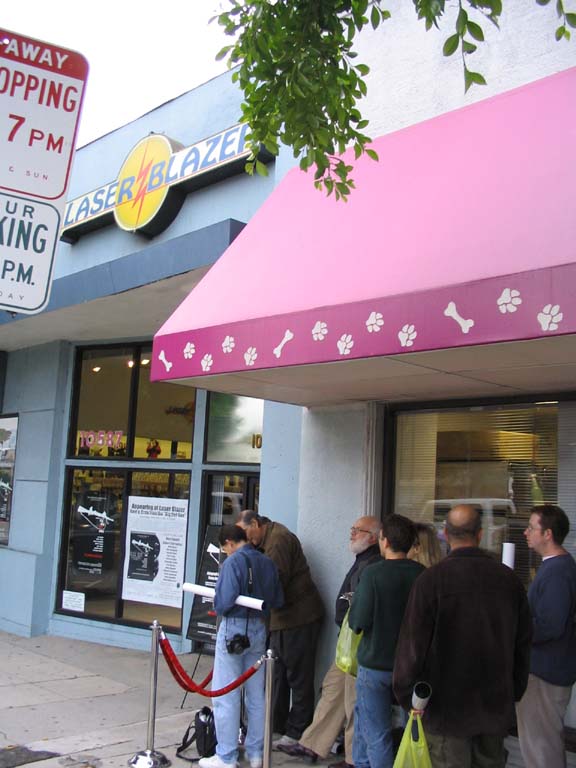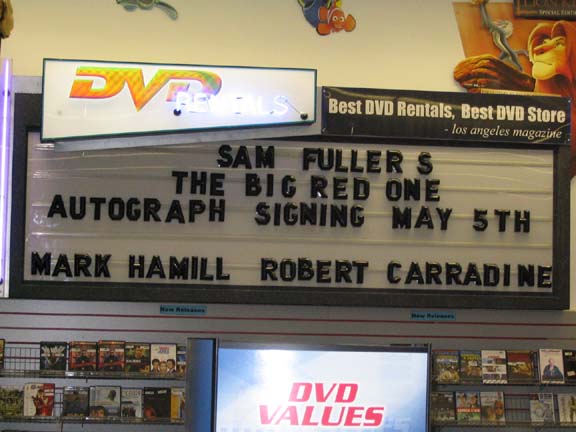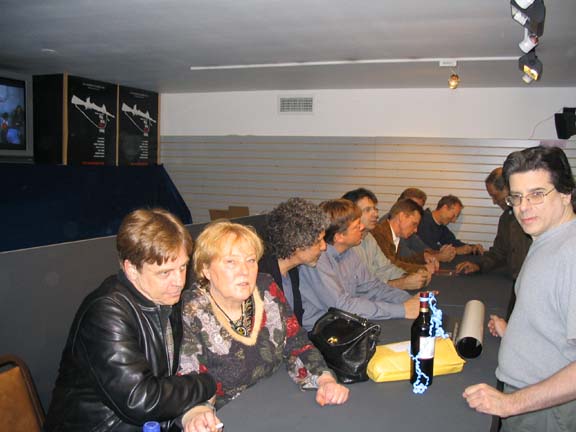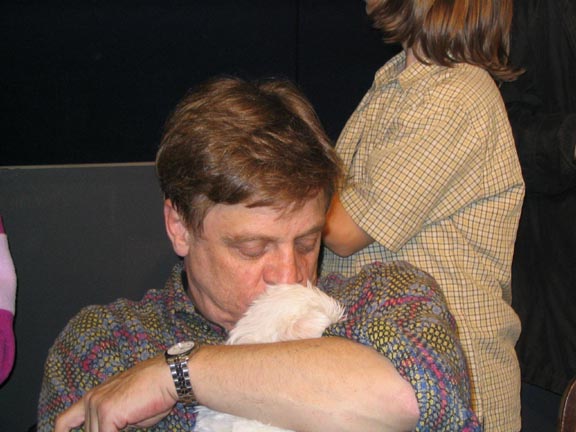Hi, everyone. "Moriarty" here with some Rumblings From The Lab...
You guys were pretty rough on Andre Dellamorte in the TalkBacks on the last Jedi Council, but I can vouch for the guy. Even if we disagree wildly on STAR WARS stuff, I admire how passionate Andre is about cinema in general, and he and I do agree on a lot of things. For example, the idea that Sam Fuller is a treasure, one of the great American rough-and-tumble filmmakers. When he asked me if I wanted him to cover the Laser Blazer event last week to celebrate the release of THE BIG RED ONE restoration on DVD, I said sure. I hoped I’d get a nice piece about the film. Instead, he turned in a great rowdy interview that makes a hell of a morning read. This is probably my favorite thing on the site all week, and I recommend you read it all.


Martin Scorsese once said that if you don’t love Sam Fuller’s movies, then you don’t love film, and I’m not about to disagree with him. Sam Fuller’s films are a reservoir of riches. His movies, like the man himself, told great uncompromising stories, American stories, stories that never feared dipping into grays or making people uncomfortable. He told it like he saw it, and learning his craft through working as a reporter, he always knew how to hook you.
Arguably the defining moment of his life was the time he spent in The Big Red One, fighting for four years in World War II. He addressed this combat in all his war films, but the film THE BIG RED ONE was special to Fuller, it was the most autobiographical. Unfortunately, his original cut was too long for the studio in 1980 and they chopped it down to a two hour running time, and released it with narration written by someone else. At the time Fuller remained mum, but since its release the legend of his longer director’s cut has grown. Fuller died in 1997, but last year Richard Schickel and his documentary team were told of some footage in Kansas, and began making what is now called a Reconstruction (calling it a director’s cut isn’t exactly fair since Fuller couldn’t supervise it). It’s hard to know what Fuller would have wanted, but with the additional fifty minutes of footage, it is at least closer to his original vision, and can right be called a masterpiece. I love this film with every fiber of my being, and as I enthuse in the interview section, I think it’s the best World War II film ever made.

To celebrate this release, Laser Blazer, one of the best DVD rental and sales house in LA, had a signing, with stars Mark Hamill, Robert Carradine, Kelly Ward, Perry Lang, Ken Campbell, Joe Clark, composer Dana Kaproff, Lee Marvin’s widow Pam Marvin, Christa and Samantha Fuller, and restoration editor Bryan McKenzie and restoration post supervisor Brian Hamblin in attendance.
As was mentioned on the DVD, and in previous interviews, the actors have stayed in touch, so the signing was not so much like a normal affair where artists are slugging through the event, but where there was as much interaction going on between the signees as it was with the fans. I first got a chance to sit down with Mark Hamill, and it was strange to be seated next to him. Like many readers here I grew up with him as Luke Skywalker, and frankly I was a little nervous. But whatever apprehensions I had about meeting an idol were soon washed away with Mark’s chumminess and passion for this project:

You play a character named Griff, and Griff is a name Sam Fuller inserted in a lot of his films, FORTY GUNS for instance.
Mark Hamill: Gene Evans was on “Texas Wheelers,” this TV show I did. We were talking about the Sam Fuller film he was in, and his name was Griff.
Yeah, in FORTY GUNS.
Mark: So, what are you going to ask me about that?
Did he ever tell you about Griff, the history of Griff?
Mark Hamill: He didn’t have to because the way Sam worked. He was a master storyteller, and he was just as interesting tell his stories in the form of his movies, or just telling you about the time he went to lunch with J. Edgar Hoover and Richard Zanuck. If you’re a cinephile, you couldn’t be around a more interesting guy. I went in to tell him why I didn’t want to be in THE BIG RED ONE. I thought it was one of the best war scripts I ever read, but I was going to do a play in New York, and I didn’t want to be a part of an ensemble, with someone I idolized and was afraid of meeting in case he turned out to be not what I wanted him to be – Lee Marvin. Now I never got a chance to put that argument forward, although I had gone in having already turned it down. And I’m very lucky because they didn’t pay attention to me, and when I came in to tell them why I didn’t want to do it, I just became hypnotized, following the aroma lines like in a Warner Brothers cartoon, I was spellbound. And I realized, probably while I was walking out the door, that I just enlisted in the army. (Mark stands up and does a Fuller impression) “Mark, it’ll be wonderful, rar rar rar.” You know, with his big cigar. And I’m thinking, this is not hearsay, this is his story, THE BIG RED ONE. In the script I’d ask “This is so wild, why does XYZ happen?” And then he’d tell me! “This part happened to me, this part happened to my buddy, but I put ‘em together, and it really wasn’t you it was a guy by the name of Kulowitcz, but I like you, you’re young, you’re handsome so (here Mark enters his Sam impression again) I’ll give it to you, cause I like you.” So you ask him a question and he wouldn’t necessarily answer it literally, but what I got from him telling you these things was that to him Griff was just a great name. Like Sam, it was just a big, dig in your talons red meat name and to him it was his Candide, it was his every man’s thing and we tend to go back to the same well again and again. Sam named him Griffin and I named one of my son’s Griffin, and the only Griffin I knew before was this guy my sister dated when I was in grade school, and he was a surfer in San Diego, and he looked like what surfers are supposed to look like, with great blond hair. And I just thought “Oh my God I could never be that” and he would surf, and he was a fun guy to be around, So that was the only person I ever knew named Griff until all of Sam Fuller’s movies. And if you asked me at the time, I didn’t consciously say “This is for Sam” but I realized that it just permeated my DNA, and after Nathan and we didn’t know what to call our next son, and he wound up being the hardest to name of them all. My wife has a song about her, “Hello Mary Lou” by the Isley brothers, but you know, I don’t have any songs, I mean, Nathan has Nathan Detroit, great entrance number, he has Nathan Hot Dogs, Nathan Hale, there’s lots of good things. With Griffin he also had that symbol, the mythic eagle lion mythological creature, so it all just seemed to fit. And then I realized how much it just really did become a part of me, and how I didn’t want to let go, and probably why the guys and I stayed in touch. It’s almost like we’re alma maters of the same high school, or the same army unit. We’re together for birthdays, separations, all the family stuff, we have barbeques, this and that. It’s not obsessive but every now and then, that’s only happened with this and “Harrigan n’ Hart” a Broadway show I did, we stick together there. Other than that, I don’t see people I’ve worked with very often. And I always regret… Lee (Marvin) always said “Come down to Arizona and stay a week.” We kept putting it off, and then it never happened. I really miss him. And I really think, as satisfying as it is to finally see the movie I read… The first time I saw the truncated version no one tipped me off. I saw it in the theater! I was doing a play, Monday was my day off, and they screened it and I Was like “Huh?” I was internally outraged, but in the pressure cooker of being a theater with all these journalists that were going to write about it in their newspapers, and others who would interview me on TV… And they all really liked it, and I though” I’ll collect my thoughts and not go off on a tangent, and not talk about how devastated he (Sam) was.” And I talked to Sam and I talked to Lee and they were publically supporting it. So it was not up to me to go on Dave (Letterman) and say “Ugh, they ruined it. They butchered it, wah wah wah.” You want to give people the chance, you don’t want to keep people out of the tents, and it got great reviews, it made top ten lists then. But the things that really attracted me to doing the film were all the things they cut out. Because to try and get a narrative through-line they said “Well, what about this scene where they’re sitting around? What about this scene where they’re in an insane asylum? What about this scene where Griff’s having sex with a middle aged insane woman – the beautiful Stephane Audran – anything that didn’t have anything to do with action adventure was gone. It played like a really long trailer, and it wasn’t the movie I wanted to do. But after all these years, the only two people not here to enjoy it are Sam and Lee.
The two guys who survived the war.
Mark: IRONIC! We forced Sam out of the country, to become an ex-patriot, because that’s the way we treat artists, we say “God, you’re too old, you’re out of fashion.” And those people in France… Jerry Lewis goes out of favor in the seventies, arguably, and it takes people until he’s on Death’s door to say “But look, he gave us THE BELLBOY, THE ERRAND BOY and THE LADIES MAN, all those years with Dean Martin. They gave Chaplin and award before he died, and Stan Laurel, but normally you have to die first.
At this point composer Dana Kaproff showed up
Mark: Hey Dana. Oh, my god, what a great job you did. I’ve always loved the score, and you can to talk Ain’t It Cool while you’re here. You should - you know better than I - they told me, the mantra of mine over the years was “When are we going to get Sam’s cut? When are we going to get Sam’s cut?” and I was told – probably just to put me off – “It doesn’t exist!” Don’t tilt at windmills, it’s gone, it’s burned, when Lorimar got bought by Warner Brothers they had to clear stuff out. So I just gave it up. And I’m sure I was a pain in the ass to Gene Corman, or any of those people, all of them. So it was a real mystery, and if Richard Schickel wasn’t more stubborn than I, they never would have discovered it. Now (Dana) did you find old sheet music?
Dana Kaproff: Well, we had the old tracks, so I listened to what I did twenty five years ago (Mark laughs) and I added to it on the new scenes.
So did you compose for the three hours cut first, and then they trimmed it?
Mark: I don’t think it ever got that far.
Dana: No, I composed to the shorter cut. Sam had been removed already.
Mark: So did he hire you before he was removed?
Dana: No, David Picker hired me.
Mark: Did you replace anybody?
Dana: No, no, no no, they hadn’t gotten to that
Mark: Okay.
Dana: They had taken Sam off the film because it was too long and he didn’t want to cut it down any more
Mark: What Dana did is much harder than me (with the reconstruction), because I’m watching this thing saying “I see myself doing this scene, I sure don’t remember doing it.” Really. It’s the most bizarre thing, I said to the boys, “did they do us and send us home when we spanked that little kid?” But I remember reading that, I remember the kid on the set prepared to do it, but I don’t remember standing there and watching Lee spank this boy. Because it’s the perfect example of the kind of catch in your throat, funny but it’s poignant, and stupid and just quirky as hell. And the advantage of this - the living history aspect of it - was being able to say “You made this up, right?” and inevitably it either happened to him (Fuller) or it was hearsay once removed. A buddy that he trusted said “You know that guy that cracked up? He delivered a baby in a tank!” That was one thing that he told us, and once you got to know Sam, he was full of stories like that. I was raised on these patriotic flag wavers (movies) that were meant to boost morale in the day, black and white movies, and in terms of World War II films this one really stood out, and my running gag with Sam was, cause the guys are all going to hate me cause I got top billing with Lee, instead of being with the four horseman below the title but as Lee Marvin would say “Fuck ‘em, they’re not in STAR WARS.”
(Dana and I laugh)
Mark: “Yeah, but it doesn’t make it any easier for me on the set!” you know, and I’m not expecting to move in and say “You know I want to deliver the baby, and let Kelly (Ward) suffer.” I wasn’t like that, but that’s just the way it was, and I don’t know why I brought that up.
Dana: It was interesting to add the additional score because I did have to revisit what I had done twenty five years ago and try and match it. It couldn’t suddenly sound like something different, cause you’d go “What the hell was this now?”
Mark: Now did you listen to any of his (Fuller’s) other scores to see what he sort of favored, or by that time…
Dana: No, but it had been around for twenty five years, it already had its themes.
Mark: But not went you wrote the original score?
Dana: No when I wrote the original score it was a different matter.
Mark: Well, that’s what I’m curious about. Did you feel any compulsion to, did you know any of Sam’s other works?
Dana: Sure, but I didn’t feel the compulsion to match his other works, because this was also very different.
Mark: You’re absolutely right.
Dana: So I was actually more stimulated by other great war films, like THE GREAT ESCAPE and THE BRIDGE ON THE RIVER KWAI, things that really influence me in coming up with a unifying theme that would play throughout the movie.
Mark: And there’s a spareness to it, it’s not in any way this pompous, overly orchestrated
Dana: Wallpaper.
Mark: Yeah.
Dana: I think that was his sensibility.
Mark: I’m sure Sam loved it. That’s why I’m surprised to hear this, because I would have assumed Sam hired him and when he was removed, you stayed on. But it probably never got that far. But I know that Sam saw it in a way that, because the budget being spare. You know, like the rest of the guys, I got my start in television, you do the master, you do the two shot, the close up, and the over the shoulders, and people were standing around going “when are they going to do my coverage?” because Sam, through pre-planning and then his ability to combine stuff because there’s no money, shoots it in a way that curiously works for this movie. It gives it more of a documentary free form feel. And only in the restored version do you get that sort of eccentric rhythm of just intense action and then purposely standing around, eating their K rations. I’ve had these war veterans in their eighties say, or at least one guy said “that was too real. I didn’t enjoy it” Like those survivors of the Titanic that didn’t enjoy A NIGHT TO REMEMBER or the Cameron thing if they were still alive. Just didn’t like it. And there’s these other guys that nodded. Not so much towards the whole movie, but that say, that aspect right there, that if you hadn’t been there then you couldn’t have that eye for that kind of detail. And I learned so much more about World War II, not only because of my enthusiasm for trying to get into the mindset of somebody who would be back there, but in school you get it in a really dry way, so you memorized dates, and you know Mr. Churchill and you know D-Day, etcetera, etcetera, just to get good grades or promoted. But they don’t ignite any sort of passion in you. And this is pre-Tom Brokaw’s “The Greatest Generation.”
CLICK HERE TO READ PART TWO OF THIS ARTICLE!!
